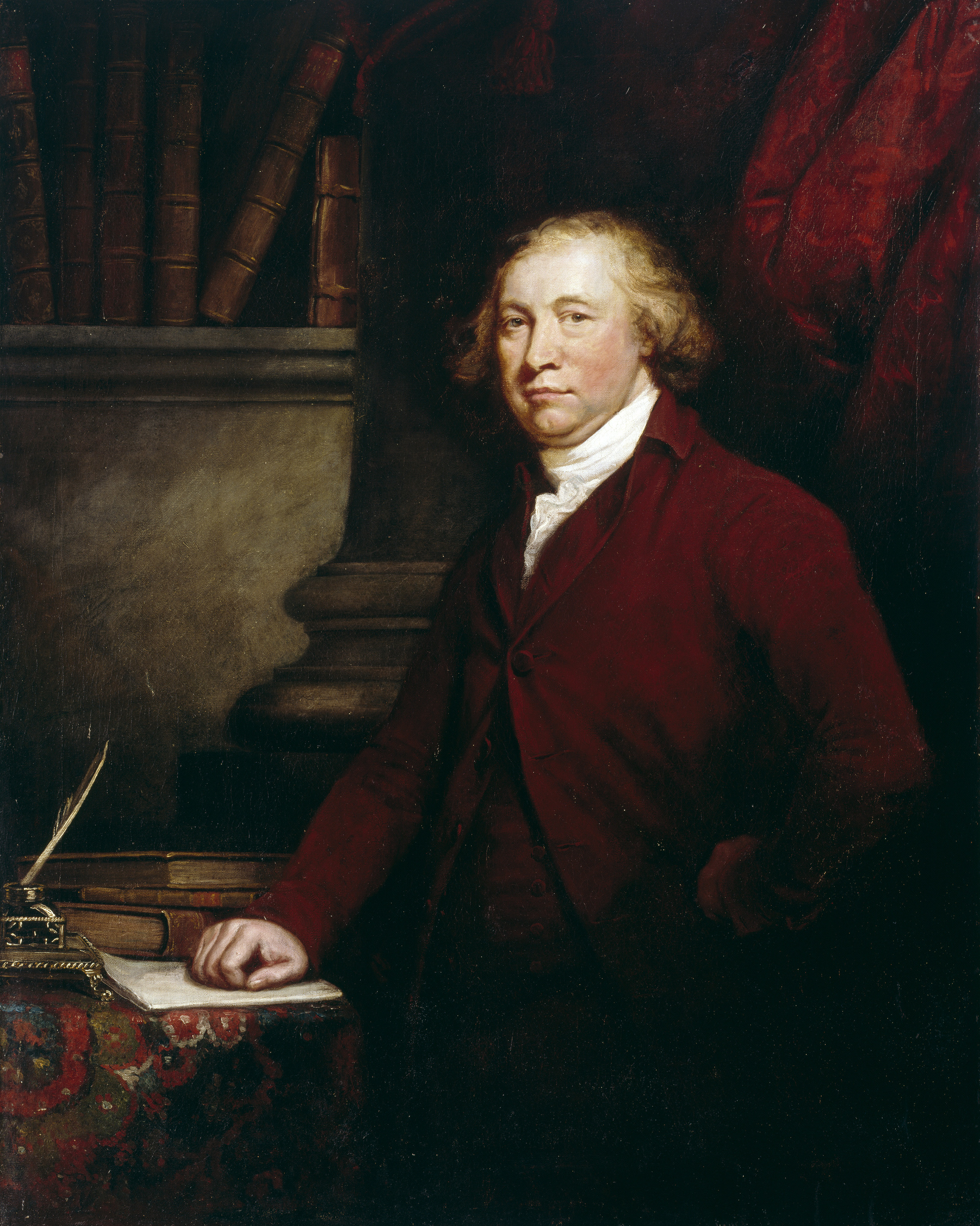
The Right, Edmund Burke, and Family Policy: Misappropriations of the “Little Platoon”
Madeleine Armstrong
Oil painting portrait of Edmund Burke by James Barry (Public Domain)
This article is part of our series on Transnational Christian Nationalism, and its impact on politics, the rule of law, and religious freedom. If you’d like to explore other articles in this series, click here.
At the annual gala of The American Conservative magazine in Washington, D.C. five years ago, the U.S. Vice President J.D. Vance argued that liberals were “ignorant of the role of family and community” in supporting national prosperity. He invoked the eighteenth-century Irish statesman Edmund Burke, widely known as the father of conservatism, to criticise the individualism of the Left:
I think that they’re missing something fundamental, something that Edmund Burke would’ve recognized, that the institutional and economic and community dynamics in which we’re raised, they influence us, they influence what’s possible to us, they influence what’s available to us, and they influence how we ultimately exercise that personal responsibility that’s so important.
Vance implied that Burke was the intellectual forebear of a “pro-worker, pro-family conservatism”. Appealing to Burke as a defender of middle-class family values, Vance outlined what would become the platform of his and President Trump’s campaign.
Edmund Burke is frequently referred to by American conservatives as a defender of the middle-class nuclear family. Ironically, The American Conservative magazine noted a few years prior to Vance’s speech at the gala that “no other Burkean formulation is used so prominently” by conservatives as Burke’s idea of the “little platoon,” which is generally interpreted as a metaphor for the bonds of family life. In his Reflections on the Revolution in France (1790), Burke famously argued,
To be attached to the subdivision, to love the little platoon we belong to in society, is the first principle (the germ as it were) of public affections. It is the first link in the series by which we proceed towards a love to our country and to mankind.
Burke’s idea of the little platoon has become a slogan for the right-wing movement against liberal individualism. Former U.S. Republican Senator Rick Santorum argues that conservatives should “deploy the ‘little platoons’’ against the “radical individualism” of the modern world. He also cites Burke in his book It Takes A Family: Conservatism and the Common Good, written in response to Hilary Clinton’s It Takes a Village. The National Conservatism movement, which began in England and is sponsored by the Edmund Burke Foundation, has reinforced the notion that Burke was a defender of the “traditional family”. Kevin Roberts, the head of the Heritage Foundation, appealed to “Burke, the national conservative” in his argument for the importance of family and community in an increasingly globalised world.
British Conservatives (also known as the Tories) have for many years deployed Burke’s idea of the platoon in defence of family and community life. British Prime Minister Margaret Thatcher quoted this passage of Burke’s Reflections in her speech to the First International Conservative Congress in 1997 when she argued that conservatives “believe that what is public ultimately exists for what is private–that it is the family (not the state or nation or even Church), which is the basic institution of our society, without which all the rest collapses.” The former Conservative Secretary for Health Sajid Javid opened the Social Fabric Summit in Westminster in the spring of 2022, intended to address a “crisis of connection” in the wake of the coronavirus pandemic, with a more general reflection on Burke: “many years have passed since Edmund Burke wrote about ‘the little platoon we belong to in society’,” he began, praising this as a “timeless insight” into the connection between “strong families, flourishing communities, and individual freedom.”
The Tories have been criticised for their misappropriation of Burke’s idea of the little platoon. “What most modern Tories ‘know’ of his work,” according to The Times, “is a comment in the Reflections [. . .] to love the ‘little platoon’”. Colin Kidd observes that “the Conservatives have happily aligned the Big Society concept of charities and volunteers with the ‘little platoons’ championed by their acknowledged forebear, the political philosopher Edmund Burke.” Emily Jones also notes that One Nation conservatives, generally in favour of Brexit, have used Burke’s notion of the little platoon to complement their arguments for “the importance of tradition, religion, and property”. In Little Platoons: How a revived One Nation can empower England’s Forgotten Towns, David Skelton argued that the British people must “take back control” of their domestic lives, explaining that he “decided to call this book Little Platoons as that old Edmund Burke phrase encapsulates the importance of family”. There is a kind of nationalist “mythmaking,” Jones argues, supported by such interpretations of Burke on the little platoon.
The Family in Burke’s Political Thought
What did Burke really mean when he argued that love for our country and mankind began with love for “the little platoon we belong to in society”? There is no doubt that Burke advocated for the importance of family life. “We begin our public affections in our families,” he wrote later in the Reflections. “No cold relation is a zealous citizen”. The problem is that his peculiar metaphor of the little platoon has been oversimplified by politicians on the Right and used to support an idea of the nuclear family strangely reminiscent of post-war suburban America. Set within its historical context, the passage on the little platoon is clearly not a defence of the Western nuclear family but rather a warning about the dangers of prioritizing abstract ideas of the nation over local and familial connections. We must also look beyond the passage on the little platoon to see that Burke was really a defender of the rights of the family in its many cultural forms against the violations of imperial and tyrannical governments.
The passage on the little platoon was primarily addressed to the nobility of France who betrayed their families in order to retain their positions in government during the French Revolution. Burke was essentially defending the idea of a feudal order in which the power of individuals was restrained by local and familial obligations. When he wrote that the subdivision we belong to in society “is a trust in the hands of all those who compose it; and as none but bad men would justify it in abuse, none but traitors would barter it away for their own personal advantage,” he was criticizing the deputies of the National Assembly in France who claimed to represent the interests of the nation by renouncing their family titles and property. The reality, in his view, was that such men only thought of themselves. “Puffed up” with the notion of their universal benevolence, which to Burke was an impracticable notion that led only to the pretention of virtue, the deputies of the National Assembly sacrificed everything that should have been most dear to them to the state.
Throughout his political career, Burke defended the rights of the family in its many cultural forms. He condemned the Popery Laws in Ireland for denying to Catholics the right inherit family property unless they converted to Protestantism. When he led the prosecution in the impeachment trial of Warren Hastings, the governor of the East India Company, Burke drew attention to how British officers in India had interfered with local laws and customs in order to seize upon family property, and how they had violated the caste system by publicly humiliating families who did not pay the extortionate taxes imposed on them by the Company. In his draft of a plan to abolish slavery in the British empire, Burke also emphasised the importance of restoring to slaves the right to marry and to maintain a family in their own home. To Burke, the rights of the family were indispensable to civil liberty. He saw the deprivation of these rights as one of the first and most devastating effects of tyranny.
How Burke is Misappropriated as the Defender of the Western “Traditional Family”
How, then, were Burke’s ideas about the family reduced to a defense of the Western nuclear family? This is mostly due to misinterpretations of his idea of the little platoon by conservative scholars and politicians. Russel Kirk, widely considered to be one of the great American conservative intellectuals, did much to fashion Burke into a champion of middle-class family values in the 1950s. In The Conservative Mind, Kirk wrote that “Conservatism must teach humanity once more that the germ of public affections, in Burke’s words, is “to love the little platoon we belong to in society”. In The Concise Guide to Conservatism, Kirk argued that the family was ‘the primary “little platoon we belong to in society”’:
The conservative knows that, the family lacking, nothing very important in our culture can be preserved or improved. The traditional family—which, like many old-fashioned things, is an indispensable thing—gives us those roots without which we all would be just so many lonely little atoms of humanity, unprincipled and at the mercy of some iron political domination.
It was Kirk who secured Burke’s place in the American conservative tradition, and his interpretation of Burke on the family remains a touchtone for American conservatives today.1Arthur Aughey, Greta Jones and W.T.M. Riches, The Conservative Political Tradition in Britain and the United States, London 1992, p.7. Writing in a time of great cultural and economic change in the decade following the Second World War, Kirk looked to Burke as a guide and positioned him as the defender of the traditional family.
As Drew Maciag observes in The Conservative Political Tradition in Britain and the United States, “American commentary on Burke has always revealed more about the intermittent traumas of American life than it has about the historical Edmund Burke.” It is telling, therefore, that American conservatives today are again turning to Burke as a defender of the traditional family. National Conservatives, in particular, are deeply concerned with declining fertility rates and the breakdown of family life across the Western world. Burke is seen from this perspective not only as a defender of the traditional family but also of European civilisation itself. The Heritage Foundation, which supports the National Conservative movement, has also cited Burke in support of policies that focus on “family formation” a means through which to foster patriotism.
The irony is that by encouraging young people to have children and prioritise family life for the sake of their country, many politicians and social commentators on the Right are doing something akin to what Burke associated with tyrannical regimes: they are treating the family as an engine of the state. Burke was adamant that love for the little platoon we belong to in society must come before love for our country. He did not believe that love for our country should, or even could be the basis of our affections and obligations to other people. Burke was making an empirical observation when he wrote that “to love the little platoon we belong to” is the first principle of public affections, not setting out a state program for family life. If conservatives wish to emulate Burke, they should be careful to defend the rights of the family without using family policy to manufacture a particular kind of family life.
The New Right is inspired by Viktor Orbán’s family policy, and this marks a radical departure from Burke. In Hungary, concerns about steeply declining fertility rates and rising immigration have led to ethno-nationalist rhetoric surrounding the family. “We, the millions with national feelings,” Orbán argued, “believe in nation states, the defense of borders, the family and the value of work are on one side. And opposing us are those who want open society, a world without borders or nations, new forms of family”. In order to combat what he perceives to be an attack on Western civilisation, Orbán has offered tax breaks and subsidies to families with multiple children while increasing restrictions on immigration. J.D. Vance, in a speech on “Civilizational Crisis” in 2021, expressed his admiration for Orbán’s family policy. “Why can’t we do that here?” he asked. “Why can’t we actually promote family formation here in our country?”
Concluding remarks
Burke was not concerned with family formation so much as with the protection of the rights of the family. He did express deep concern with the legalization of divorce in the French Revolution because, in his view, the strength of the institution of marriage was essential to civil society. He also warned that one of the clearest signs of moral degeneration in a society was that it condoned violence toward children. Notwithstanding his admiration for the institution of the family in the West, his primary concern was to defend families of all cultures and religions from persecution by the state. Civilisation did not depend, in his view, on the size or the structure of families, but rather on the security of their rights. Burke was suspicious of any government that sought to interfere with family life in order to strengthen national ties, and he would be surprised by the way his name is invoked today to support family policy on the Right. ♦

Madeleine Armstrong (PhD History, Cambridge) is a Postdoctoral Research Associate in the Department of Politics at Princeton University.
Recommended Citation
Armstrong, Madeleine. “The Right, Edmund Burke, and Family Policy: Misappropriations of the “Little Platoon”.” Canopy Forum, November 13th, 2024. https://canopyforum.org/2024/11/13/the-right-edmund-burke-and-family-policy-misappropriations-of-the-little-platoon/.
Recent Posts










